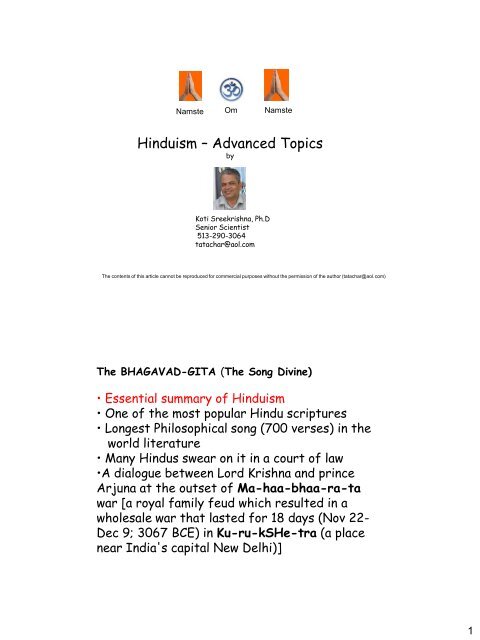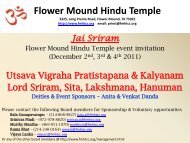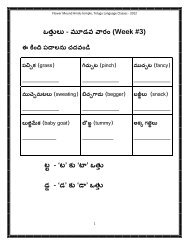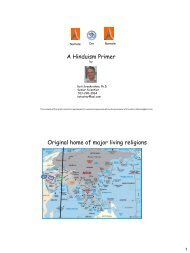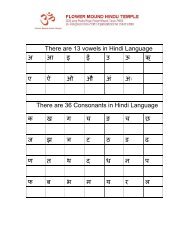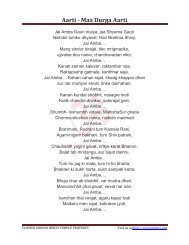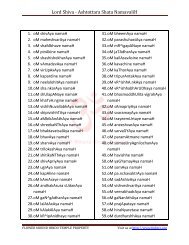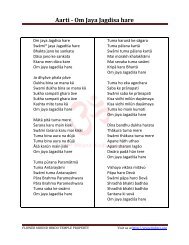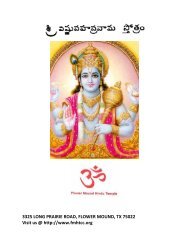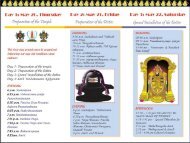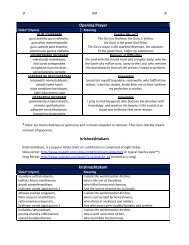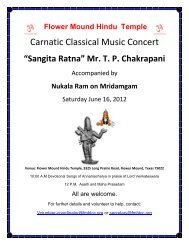Hinduism – Advanced Topics
Hinduism – Advanced Topics
Hinduism – Advanced Topics
You also want an ePaper? Increase the reach of your titles
YUMPU automatically turns print PDFs into web optimized ePapers that Google loves.
Namste<br />
Om<br />
<strong>Hinduism</strong> <strong>–</strong> <strong>Advanced</strong> <strong>Topics</strong><br />
by<br />
Koti Sreekrishna, Ph.D<br />
Senior Scientist<br />
513-290-3064<br />
tatachar@aol.com<br />
Namste<br />
The contents of this article cannot be reproduced for commercial purposes without the permission of the author (tatachar@aol.com)<br />
The BHAGAVAD-GITA (The Song Divine)<br />
• Essential summary of <strong>Hinduism</strong><br />
• One of the most popular Hindu scriptures<br />
• Longest Philosophical song (700 verses) in the<br />
world literature<br />
• Many Hindus swear on it in a court of law<br />
•A dialogue between Lord Krishna and prince<br />
Arjuna at the outset of Ma-haa-bhaa-ra-ta<br />
war [a royal family feud which resulted in a<br />
wholesale war that lasted for 18 days (Nov 22-<br />
Dec 9; 3067 BCE) in Ku-ru-kSHe-tra (a place<br />
near India's capital New Delhi)]<br />
1
•Krishna says to Arjuna that He had given the<br />
same message long ago (since times immemorial)!<br />
The message was passed on in succession for<br />
many generations through the lineage of<br />
philosopher kings of the solar dynasty.<br />
However, with time, the essence was lost.<br />
“I have appeared in the human form as your<br />
friend to revive it"<br />
• Yes, that revival of <strong>Hinduism</strong> has been<br />
happening in every generation. This makes<br />
<strong>Hinduism</strong> a vibrant (dynamic) religion<br />
(old and new at the same time!)<br />
*God is the source of everything.<br />
*God is the best<br />
*God is omnipotent and omnipresent.<br />
*True knowledge is to know God.<br />
*Death is only to the body. Soul takes on new<br />
forms until it is liberated.<br />
*Once we surrender to God, we are free from<br />
cycles of birth and death.<br />
*The good wins over evil.<br />
*God reincarnates, when needed to establish<br />
dharma (that which is beneficial to everyone).<br />
*The form of God we worship, God fixes our<br />
faith in that very form.<br />
*All pray to the same God.<br />
*True believers of God never fail.<br />
2
*Action is inevitable. No one can keep quiet.<br />
*Balanced, hyper active and lazy are human nature<br />
(“The Good, the bad and the ugly”). Try to be(come) more<br />
balanced in every way (thoughts, words & deeds).<br />
* Rise above dualities (pain & pleasure, love & hate,<br />
good & bad, gain & loss, …)<br />
*Do your work without greed. Don't be lazy.<br />
* Do the work that suits you best.<br />
*Dedicate all your actions to God.<br />
* You have control only on your actions and not<br />
on the result- Five factors govern the outcome all<br />
actions (good or bad): Context, individual, tools at one’s<br />
disposal, how the tools are used, and the unknowable<br />
(luck, fate, karma, natural calamities, etc).<br />
*Share your fortunes with others, otherwise<br />
you are like a thief, who only exploits.<br />
*Always support what is right.<br />
*Follow moderation. Maintain a good balance of<br />
work, leisure, food and pleasure.<br />
*Be an example for good.<br />
*Be humble and tolerant.<br />
*Lust, anger, and greed lead to sorrow.<br />
*Love (faith), light (knowledge) and life<br />
(selfless work) are the ways to God.<br />
*Love all. See ONE in all and all in ONE.<br />
3
*You are your best friend and your worst enemy.<br />
*Only few people truly realize the truth.<br />
*December month and the spring season are very<br />
dear to God.<br />
*Easy to please God. Just offer some water, or a<br />
flower, or a leaf with faith or just think of God.<br />
*Wisdom + Action = Success.<br />
*The greatest Mantra is Om (AUM)<br />
OM (AUM)<br />
Om or AUM consisting of four parts A-U-M & silence is of<br />
paramount importance in <strong>Hinduism</strong>.<br />
It is also called ―praNava‖, to mean that it pervades life and runs<br />
through our praaNa or breath.<br />
Om is the w(Om)b of everything.<br />
Om is an eternal syllable. It represents ―Brahman‖ the absolute<br />
GOD — omnipotent, omnipresent, and the source of all manifest<br />
existence.<br />
GOD is incomprehensible; so a symbol helps us to link with the<br />
Unknowable.<br />
Om, therefore, represents both the un-manifest (nirguna) and<br />
manifest (saguna) aspects of GOD.<br />
Om is also sacred to every one of the religions (Jainism, Buddhism,<br />
and Sikhism) that took shape in the Indian sub-continent.<br />
4
OM (AUM)<br />
Every Vedic chant begins and ends with Om. Not only that, it is the<br />
supreme mantra in itself. In the Bhagavad-Gita (7:8), Lord<br />
identifies himself as ―Om‖ amongst Vedic hymns (praNavah sarva<br />
Vedeshu <strong>–</strong> ―Om‖ in all the Vedas).<br />
The ideal way to say O(a-u)m is to first take a deep breadth, as<br />
deep as you can, and then start the chant and keep chanting O (a-u)<br />
as long as you can, finally ending with ―m‖ followed by silence.<br />
(When you listen to the way the Tibetan monks chant ―Om‖ you will<br />
know what I am talking about!). As you hit ‖m‖ you can feel the<br />
resonance in your brain; you will have exhausted your breath so fully<br />
that silence becomes inevitable. Even if someone offers you<br />
$1billion at that moment, you will not be able to say ―yes‖. That may<br />
not be good for business, but certainly a good ―Om‖!<br />
OM (AUM)<br />
Thus, a good Om runs through every part of our vocal chord, until<br />
we run out of breath! In other words, we use every part of our vocal<br />
chord. All the primary vowel sounds including silence (no sound) are<br />
contained within it. Bhagavad-Gita says that every word is nothing<br />
but a fragment of Om (among words, I am the single syllable ‗Om‘;<br />
BG10:25)! If we learn to chant Om properly, we will have excellent<br />
vocal variety and a better ability to articulate our words!<br />
During meditation, when we chant Om, we create within ourselves a<br />
vibration that is in tune with the cosmic vibration and we start<br />
thinking universally. The momentary silence between each chant<br />
becomes palpable. Mind moves between the opposites of sound and<br />
silence until, at last, it ceases the sound. In the silence, the single<br />
thought—Om—is quenched; there is no thought. This is the state of<br />
trance, where the mind and the intellect are transcended as the<br />
individual self merges with the Infinite Self in the pious moment of<br />
realization. It is a moment when the petty worldly affairs are lost in<br />
the desire for the universal. Such is the immeasurable power of Om.<br />
5
OM (AUM)<br />
A simpler metaphor for Om is ―tree‖.<br />
We can think of:<br />
A as ―spring‖ (tree budding with fresh leaves),<br />
U as ―summer‖ (growth- rich with leaves),<br />
M as autumn (letting go gracefully-fall foliage),<br />
and silence as ―winter‖(leafless- not life less).<br />
The tree looking dead in winter springs back. That silence<br />
represents immortality or eternity.<br />
OM (AUM)<br />
We read the most elaborate exposition of the four parts of Om in<br />
MaanDukaya Upanishad, which is summarized below:<br />
First is Waking / Gross: The first aspect of Atman is the Self in<br />
the Waking state. In this first state, consciousness is turned<br />
outward to the external world and the atman experiences the gross<br />
objects of the phenomenal world.<br />
Second is Dreaming / Subtle: In this second state, consciousness<br />
is turned towards the inner world. Using the very same faculties as<br />
in above, the atman experiences the subtle objects of the mental<br />
realm.<br />
6
OM (AUM)<br />
Third is Deep Sleep / Causal: The third aspect of Atman is the<br />
Self operating in the Deep Sleep state, Prajna. In this third state,<br />
there is neither the desire for any gross or subtle object, nor any<br />
dream sequences. In deep sleep, all such experiences have receded<br />
or merged into the ground of undifferentiated consciousness. Here,<br />
one is filled with the experience of bliss, and can also find the way<br />
to clearer knowledge of the two preceding states.<br />
The Fourth Aspect is Turiya: In this fourth state, consciousness is<br />
neither turned outward nor inward. Nor is it both outward and<br />
inward; it is beyond both cognition and the absence of cognition.<br />
This fourth state of Turiya cannot be experienced through the<br />
senses or known by comparison, deductive reasoning or inference; it<br />
is indescribable, incomprehensible, and unthinkable with the mind.<br />
This is Pure Consciousness itself. This is the real Self. It is within<br />
the cessation of all phenomena. It is serene, tranquil, filled with<br />
bliss, and is one without second. This is the real or true Self that is<br />
to be realized.<br />
OM (AUM)<br />
OM at your finger tips- How to Type it on your Computer?<br />
To get the Om symbol on your computer screen, open MS Word and<br />
key in backslash ( \ ) in Wingdings font. You will type in Om!<br />
\<br />
7
Om parvat (aka Adikailash, little Kailash,<br />
Baba Kailash, Chhota Kailash) a Mountain<br />
top (20,312 feet) Om carved by nature in<br />
Pithoragash district of Uttarkhand is an<br />
ancient holy Hindu mountain in the Himalayan<br />
mountain range, lying in the Pithoragarh<br />
district of Uttarakhand, near Sinla pass.<br />
Its appearance is distinctly similar to Mount<br />
Kailash in Tibet.In addition, its snow deposition<br />
pattern appears as the Hindu sacred syllable<br />
―AUM‖. Near Om Parvat lie Parvati Lake and<br />
Jonglingkong Lake. Jonglingkong Lake is<br />
sacred, like Mansarovar, to the Hindus.<br />
Opposite to this peak is a mountain called<br />
Parwati Muhar, whose snow shines like a crown<br />
in the sun.<br />
Gaayatri mantra (Rig Veda 3.62.10)<br />
Meaning and Discussion<br />
Om bhU-r-bhuva-s-suvaH ||<br />
ta-thsa-vi-tu(r)-va-raE-Nyam | bha(r)gO-daE-va-sya-dhI-ma-hi|<br />
dhi-yO-yO-naH:-pra-cO-da-yA-t||<br />
Brahman, Earth, Space, and Heaven!<br />
May He stimulate our intellect<br />
We meditate on that adorable light of the divine sun<br />
Om = Brahman, bhUH=Earth, bhuvaH= Space, suvaH=Heaven<br />
tat=that, savituH=Sun, varaENyam= adorable, bhargO=light,<br />
daEvasya= of divine, dhImahi= we meditate<br />
dhiyO=Intellect, yO=He, naH:= Our, pracOdayAt= Stimulate<br />
8
Gaayatri mantra (Rig Veda 3.62.10)<br />
Meaning and Discussion<br />
gaayantam traayate iti gaayati<br />
Gaayatri is that which protects those who recite it<br />
Arrangement of verses in a particular rhythmic or measured<br />
pattern is called a poetic meter. There are many such meters, and<br />
one among them is the gaayatri meter. This meter has 24 syllables<br />
(axara). Lord declares it as the best (gaayatri chhandasaam aham =<br />
"Of meters, I am gaayatri": BG, Ch. 10 v.35).<br />
Gaayatri mantra has three functions:<br />
First it wakes us up.<br />
Next it stimulates us to<br />
connect with the path of Divinity.<br />
Finally it surrenders us to Divinity; we are united with the Divine.<br />
Om bhU-r-bhuva-s-suvaH ||<br />
Gaayatri mantra (Rig Veda 3.62.10)<br />
Meaning and Discussion<br />
[Om = Brahman, bhUH=Earth, bhuvaH= Space, suvaH=Heaven]<br />
Brahman, Earth, Space, and Heaven!<br />
(We are immersed in our own little world. By invoking some of the<br />
great spheres of existence and the all-pervading Lord, we wake up<br />
to a greater reality of our existence. All the mundane things that<br />
used to haunt us become insignificant. This awakening is the first<br />
step in spiritual progression. This single stride itself brings<br />
about a lofty transformation in our life).<br />
9
Gaayatri mantra (Rig Veda 3.62.10)<br />
Meaning and Discussion<br />
ta-thsa-vi-tu(r)-va-raE-Nyam | bha(r)gO-daE-va-sya-dhI-ma-hi|<br />
[tat=that, savituH=Sun, varaENyam= adorable, bhargO=light,<br />
daEvasya= of divine, dhImahi= we meditate]<br />
We meditate on that adorable light of the divine sun<br />
[We are now aroused to connect with the divine. In this gaayatri<br />
mantra, the object of reverence is "solar brilliance" that sustains<br />
life. Thus, this mantra is also called the savitaa gaayatri mantra.<br />
We have gaayatri mantras for viSHNu, shiva,<br />
gaNEsha, subrahmaNya, laxmi, durga, sarasvati, hamsa, agni,<br />
narasimha, garuDa, brahma, pranava and so on. In fact gaayatri<br />
mantra can be tailor-made to any deity, person or object of<br />
reverence.<br />
Gaayatri mantra (Rig Veda 3.62.10)<br />
Meaning and Discussion<br />
As we progress, divinity becomes our habit. Once it is A HABIT, it<br />
is very hard to break. If we take A out, HABIT remains, if we take<br />
B out, ABIT remains, if we take A out BIT remains, if we take B out,<br />
IT remains. I is ego which is very hard to break, thus IT remains!]<br />
dhi-yO-yO-naH:-pra-cO-da-yA-t||<br />
[dhiyO=Intellect, yO=He, naH:= Our, pracOdayAt= Stimulate]<br />
May He stimulate our intellect<br />
[The final step is total surrender to the divine. Seeker unites with<br />
the sought. We become a habitat for divinity.<br />
A person with Brahman-consciousness is ever happy! This person<br />
rejoices, rejoices and rejoices (nandati nandati nandati eva) under<br />
all circumstances (Adi Shankaracharya in Bhaja Govindam)].<br />
10
Where the mind is without fear and the head is held high;<br />
Where knowledge is free,<br />
Where the world has not been broken up into fragments<br />
-by narrow domestic walls;<br />
Where words come out from the depth of truth;<br />
Where tireless striving stretches its arm towards perfection;<br />
Where the clear stream of reason has not lost its way into the<br />
-dreary desert sand of dead habit;<br />
Where the mind is led forward<br />
by thee into ever-widening thought and action-<br />
Into that heaven of freedom, my Father, let my country awake.<br />
-From Gitanjali by Rabindranath Tagore<br />
- Nobel Prize winner for literature in 1913<br />
http://nobelprize.org/nobel_prizes/literature/laureates/1913/tagore-bio.html<br />
Kolu (Dolls)<br />
Celebrated as part<br />
of “Navaratri”<br />
-A popular 10 days<br />
festival<br />
11


